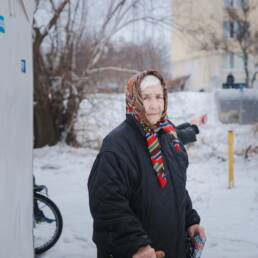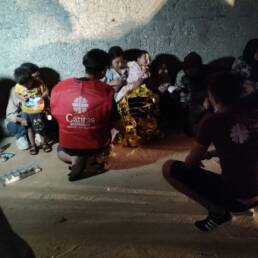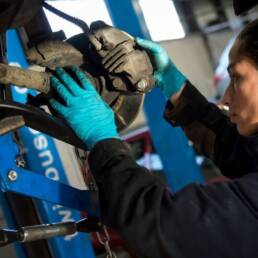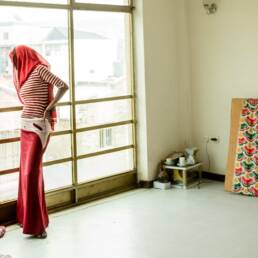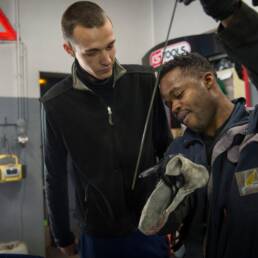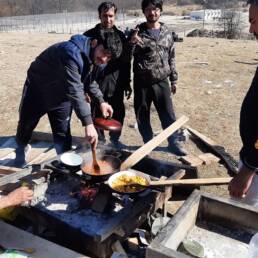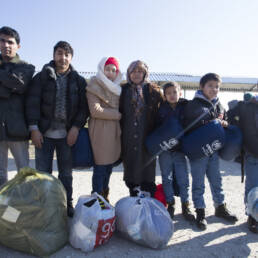Author
Leïla Bodeux
Policy and Advocacy Officer
Tel: +32 (0)2 235 26 55
lbodeux@caritas.eu
Based on Caritas Europa’s intervention at the webinar Migrants and refugees facing the Covid-19 crisis, what lessons for the post-pandemic time?, organised by the Conference of INGOs of the Council of Europe.
Much has already been said about the immense impact that COVID-19 has had on migrants. The pandemic has not only exacerbated difficulties that have been present for years, but has also created new ones.
To cite just a few examples, the right to asylum has been undermined, both in terms of access to the territory and in terms of procedures, which have been suspended, delayed, or digitized – with all the difficulties that this entails. Life in already crowded reception centres and refugee camps, such as in the Greek islands for example, has deteriorated further. The vital support given by NGOs, associations and volunteers to migrants living in precarious conditions, or seeking social and professional inclusion, has diminished. Family reunification, too often an uphill battle, as well as legal pathways for protection, such as resettlement, have been put on hold. At the health level, a precarious or non-existent administrative status has made access to health care complicated for many people. Confinement has also increased psychological problems, domestic and intra-family violence, and the risk of exploitation of all kinds.
The anxiety and multiple hardships caused by COVID-19 have increased racism and xenophobia towards migrants, which were already present before the pandemic. Precarious employment contracts, harsh working conditions, informal employment, exclusion from social security and access to public services have amplified the economic and social consequences of the pandemic for migrants. The loss of employment and income without access to a safety net has pushed many people into poverty, and has dramatically reduced remittances to families back home.
The contribution of migrants to our societies valued
Positive aspects related to COVID-19 should also be highlighted. Many countries have adopted flexible measures with regard to administrative procedures and status (e.g. automatic renewal of residence permits), have ensured access to health care for all – regardless of administrative status – and have emptied detention centres.
In order to strengthen the medical staff under pressure at the peak of the epidemic, the recognition of migrants’ diplomas and qualifications has been accelerated in some countries. Due to the lack of manpower in the agro-food sectors as a result of restrictions on free movement, the rules concerning access to the labour market for asylum seekers called upon to work in the fields have sometimes been relaxed (e.g. Belgium, France). Some countries have even gone a step further: Portugal has temporarily regularised anyone with an ongoing procedure; and Italy, panicked by the lack of at least 250,000 seasonal workers in agriculture, has launched a limited regularisation campaign in the agricultural sector and in domestic and care work.
Suddenly, COVID-19 highlighted the indispensable contribution that migrants make to our economies, and to our societies in general. A real dependence on regular or irregular labour, all too often underpaid or exploited, exists. In the health sector, all European countries have a substantial proportion of workers, from nurses to doctors, of foreign origin. In the United Kingdom, 33% of doctors were born abroad, and 20% in Germany, according to the Migration Data Portal. In the midst of the pandemic, many have worked on the front line to save lives, sometimes at the risk of losing their own. Migrants, whatever their level of education and qualification, make our societies work. A study carried out for the European Commission highlights that 13% of key workers (e.g. in agriculture, education, health, care, cleaning, etc.) in the EU are immigrants. In less skilled sectors with more difficult working conditions, such as cleaning or the food industry for example, this proportion rises to one third. The indispensable contribution of migrants to our economies and societies is obviously not new, but COVID-19 has made it possible to highlight this positive contribution, which is too often neglected by society.
Towards more humane and inclusive mobility policies
While recognition of the positive contribution of migrants to our societies is welcome, mere recognition is not enough. It is also crucial to distance ourselves from an instrumentalist approach to migration, which would consider migrants only from a short-sighted utilitarian and economic angle, relegating their rights, needs, ambitions and expectations to the background. Strong long-term measures and policies must be taken to remove the obstacles that hinder the contribution and fulfilment of migrants and to allow their full potential to develop. This includes in particular facilitated access to the labour market with decent working conditions, access to basic services and social protection, better recognition of diplomas and qualifications, and social inclusion policies. Simplification of administrative procedures (e.g. family reunification, residence permits) and widening the possibilities for obtaining a lasting legal status are essential; the word regularisation should no longer be taboo, whether for economic, humanitarian, family or social reasons.
Among the many consequences brought about by COVID-19, awareness of the positive aspect of migration is one of the key elements. In order for this recognition to become a real improvement in the lives of migrants, a change of paradigm and migration policies must take place. The restrictive and security policies that have dominated until now have shown their limits, particularly in regards to the fight against irregular migration. It is time to fully recognise the need for migrants in our societies and to implement more humane and progressive mobility policies. These must include legal channels for migration and regularisation possibilities and guarantee the rights and dignity of migrants and promote their full social and economic inclusion.



